
To plan a wedding is an exciting but often daunting task, especially when it comes to managing the wedding budget. With the average wedding cost reaching thousands of pesos, couples can feel overwhelmed trying to balance their dream wedding with financial reality.
However, a beautiful and memorable wedding ceremony doesn’t have to break the bank. By learning how to plan a wedding on a budget and prioritizing your wedding expenses, you can create a magical wedding day within your budget.
First things first: Congrats, you’re engaged! What next? Once you’ve shared the happy news with your nearest and dearest, it’s time to start thinking about wedding planning. The initial step is determining how you’ll pay for the wedding.
Figuring out your wedding budget is crucial because it will affect every decision and purchase you’ll make, from selecting the wedding venue to choosing the wedding rings and wedding stationery. Having a clear and realistic budget will provide you with a comprehensive picture of what you can afford to spend.
In this article, we’ll cover everything you need to know about wedding budgets, including typical wedding budget breakdowns, wedding budget percentages, the best tips and strategies on how to create your budget, and sample wedding budgets for you to reference.
We’ll also provide a wedding budget checklist to help you manage your wedding expenses, including costs for the wedding ceremony, wedding invitations, wedding party, wedding bands, guest list, and wedding party members. You can use all of this information to craft the perfect budget for you and your partner.
By understanding the overall costs, you’ll be better equipped to avoid common pitfalls, save money, and make informed financial decisions, ensuring that your wedding celebration is both beautiful and financially sustainable.
So let us walk you through everything you need to know about budgeting for your wedding, from understanding overall wedding costs to avoiding common pitfalls and saving up for future goals like a home with Camella Homes.
How much do you need for a wedding planning?
The first step in planning your wedding budget is understanding the typical expenses associated with weddings.
When it comes to wedding planning, the overall wedding budget plays a crucial role in determining what the couple can afford. It will also influence the type of wedding they can have, the size of the guest list, and the various elements they can include, such as venue rental, decorations, and wedding attire.
How much you need to budget for your wedding depends on your personal preferences. In 2023, the average wedding cost for 150 guests ranged from approximately 50,000 to 300,000 pesos. However, this figure can vary significantly based on factors like the choice of reception venue, the number of guests, and other considerations.

A comprehensive budget breakdown is essential to manage your wedding expenses effectively. Whether you’re dreaming of a grand wedding or plan a wedding that is more intimate civil ceremony, the budget will affect everything from the engagement ring to the wedding videographers, the wedding planner, and even the wedding favors.
Couples on a tight budget can still have a beautiful wedding by making smart choices, such as opting for a cheap wedding venue, enlisting the help of a family member as the wedding officiant, or focusing on essential elements like wedding photos and the wedding suit.
Wedding planners and wedding vendors can provide valuable advice on how to cut costs without sacrificing the quality of your celebration. From wedding decorations to the marriage license, every detail counts in creating your perfect wedding.
Understanding the money involved and making informed decisions will help you plan a wedding that fits within your wedding budget and fulfills your vision of a perfect wedding day.
Planning a wedding ceremony: What to consider
To plan a wedding involves more than just choosing colors and wedding flowers—it’s about creating an unforgettable experience that reflects your love story. But where do you start? The answer lies in understanding the financial landscape of weddings. In this guide, we’ll delve into the essential elements that shape your wedding budget, from venue rentals to wedding attire, and everything in between.
1. Venue Rental and Reception Spaces

Your wedding venue sets the stage for your celebration. Whether it’s a rustic barn, an elegant ballroom, or a scenic garden, the rental cost can vary significantly. Consider factors like location, capacity, and amenities when selecting the perfect backdrop for your special day.
2. Wedding Decor and Personal Touches
From floral arrangements to table settings to wedding flowers, wedding decor adds personality and charm. Whether you’re DIY-ing centerpieces or hiring a professional decorator, allocate a portion of your budget to transform your venue into a magical space that reflects your style.
3. Wedding Attire: Dress to Impress
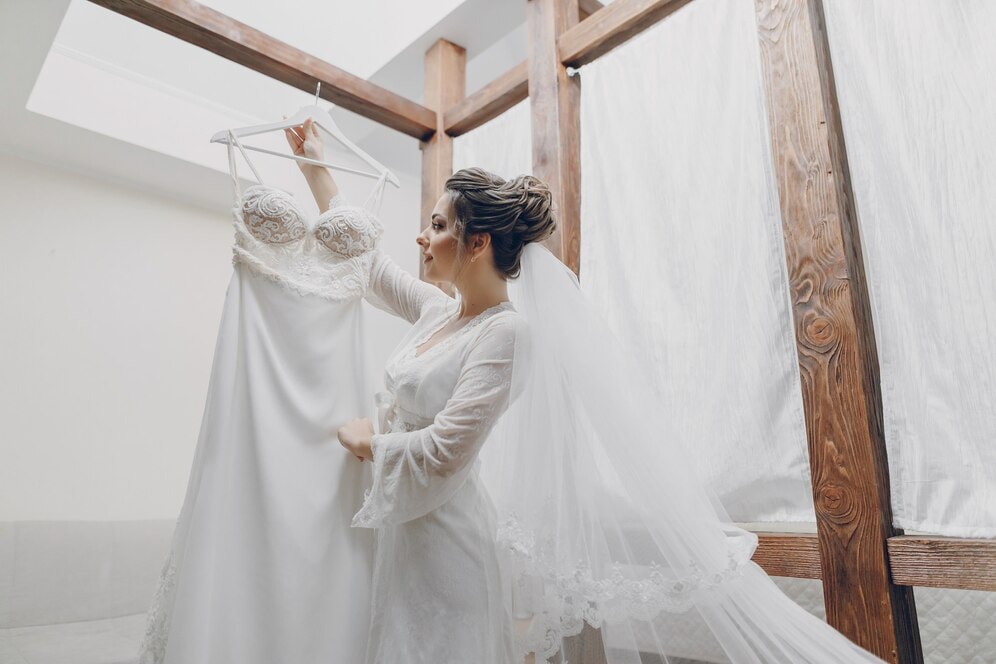
The bride’s gown and the groom’s suit are focal points of any wedding. Factor in alterations, accessories, and shoes when budgeting for your attire. Don’t forget about bridesmaids’ dresses and groomsmen’s outfits—they contribute to the overall look and feel of your wedding party.
4. Capturing Moments: Wedding Photos and Videography
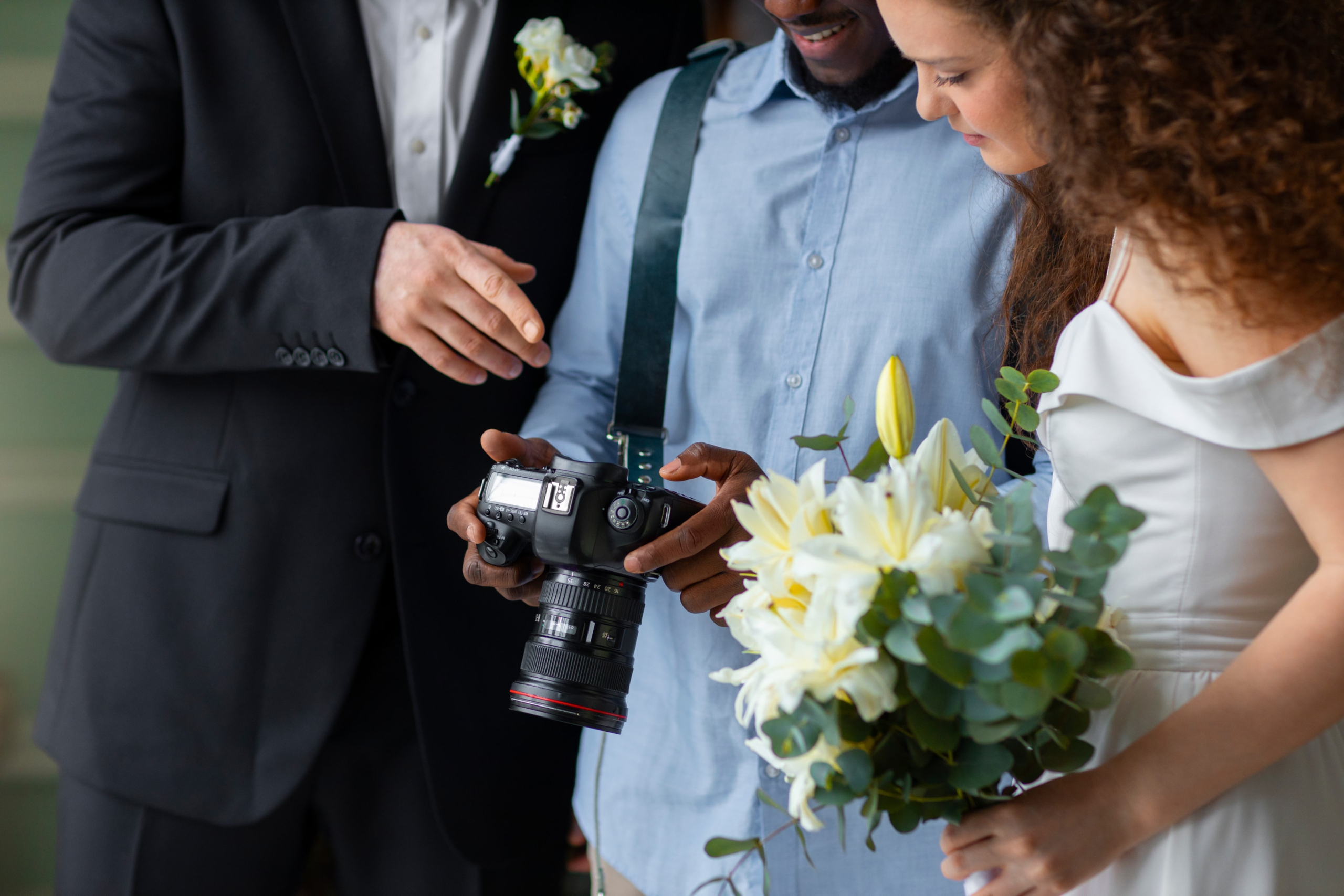
Your big day will be a whirlwind of emotions. Invest in skilled photographers and videographers to capture every tear, smile, and dance move. These memories will last a lifetime, so prioritize quality over cost.
5. The Wedding Planner’s Expertise
Consider hiring a wedding planner to plan a wedding to navigate the complexities of organizing your big day. They’ll help you stay on track, negotiate with vendors, and manage logistics. Their fee is an investment in stress-free planning.
6. Crafting Your Dream Wedding: Budget Breakdown

Break down your budget into categories: catering, entertainment, invitations, and more. Allocate funds based on your priorities. Remember, it’s not about spending all the money—it’s about spending wisely to create cherished memories.
7. Cutting Costs Without Sacrificing Quality
A tight wedding costs doesn’t mean compromising on elegance. Explore creative ways to save, such as opting for seasonal flowers, DIY favors, or repurposing ceremony decor for the reception.
8. Legalities and Symbolism: Marriage License and Ceremony

Don’t forget the legal aspects! Obtain your marriage license and decide on the type of ceremony—whether it’s a civil affair or a heartfelt religious celebration.
9. The Ring That Binds: Wedding Rings and Wedding Bands
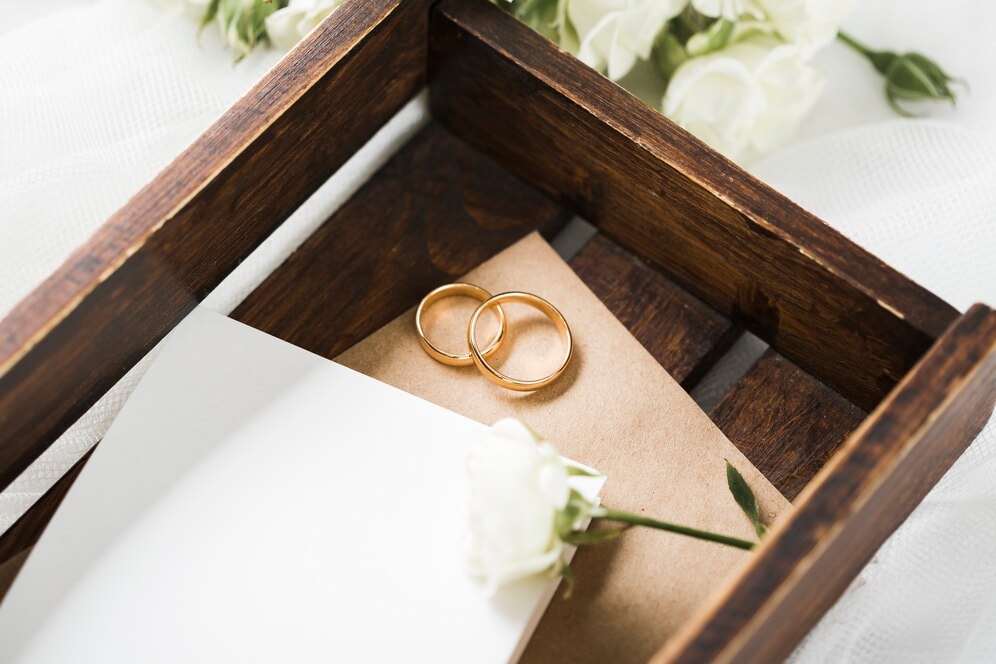
Your wedding rings symbolize eternal love. Set aside a portion of your budget for these precious tokens. Consider lab-grown diamonds or vintage pieces for affordability.
10. Crafting Your Perfect Wedding
Remember, perfection lies in the moments shared with loved ones. Whether it’s an intimate gathering or a grand celebration, your wedding will be beautiful because it’s uniquely yours.
Wedding Budget Breakdown
Organizing a wedding involves more than just choosing the ideal wedding cake and wedding venue. It requires careful financial management to ensure that every aspect of your special day aligns with your vision and wedding budget.
To help you navigate the financial maze, consider breaking down your wedding budget into specific categories. Here’s a sample breakdown that covers everything from catering costs to hidden expenses:
Overall Budget
Before diving into the specifics, it’s crucial to establish an overall typical wedding budget. This overarching figure will serve as your financial compass throughout the entire planning process, guiding every decision you make to save money.
Understanding your total available funds will help you allocate money wisely across all aspects of your wedding, ensuring that you can achieve your ideal wedding without financial strain.
Your overall costs should be realistic and reflect both your financial situation and your priorities. It’s essential to have open and honest conversations with your partner about your financial limits and expectations.
This preliminary step is fundamental in creating a well-balanced budget that aligns with your vision and financial reality.
Venue and Catering (40%)
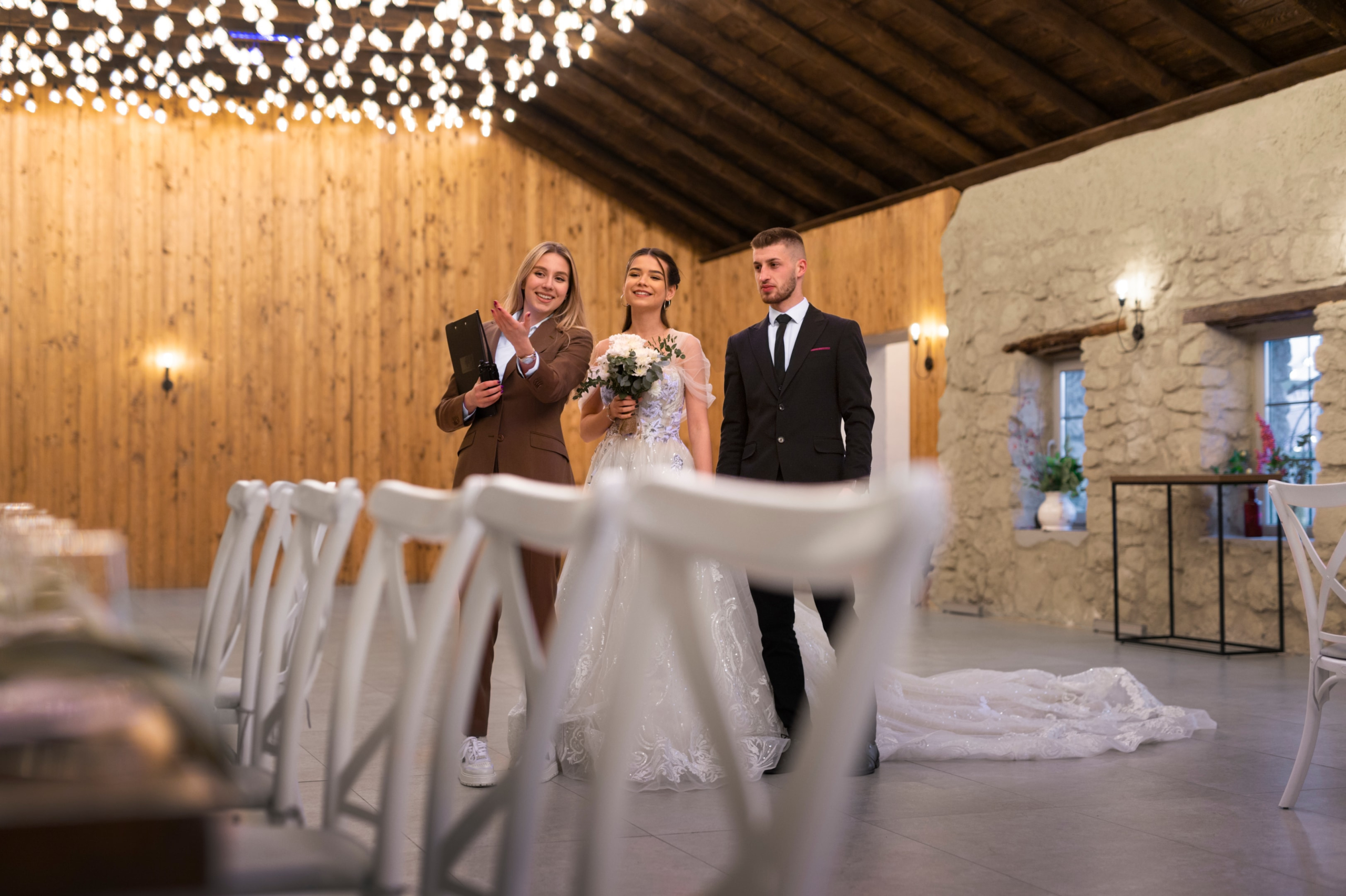
The largest chunk of your wedding cost will likely go toward the venue and catering. This category encompasses the cost of the venue rental, food, beverages, and service charges.
Whether you’re hosting your celebration at an elegant ballroom, a charming city hall, or a picturesque outdoor setting, allocating a significant portion here is essential to ensure a memorable and comfortable experience for your guests.
Choosing the right venue sets the tone for your big day and can significantly impact your overall expenses. Be sure to consider all associated costs, including any additional fees for setup, cleanup, and extra amenities.
Similarly, when selecting your catering options, think about the style of service (buffet, plated, family-style) and menu choices that best fit your vision and budget.
Photography and Videography (15%)

Capturing memories is essential. Allocate a good portion of your budget to professional photographers and videographers. They’ll immortalize your special day, allowing you to relive those precious moments for years to come.
Investing in quality photography and videography ensures that every significant moment, from the ceremony to the reception, is beautifully documented.
When selecting your photography and videography team, review their portfolios and discuss your specific needs and preferences.
It’s also wise to consider additional services such as engagement photos, photo albums, or highlight reels to cut costs. These professionals play a crucial role in preserving the memories of your wedding, making it worth the investment.
Wedding Dress and Attire (10%)
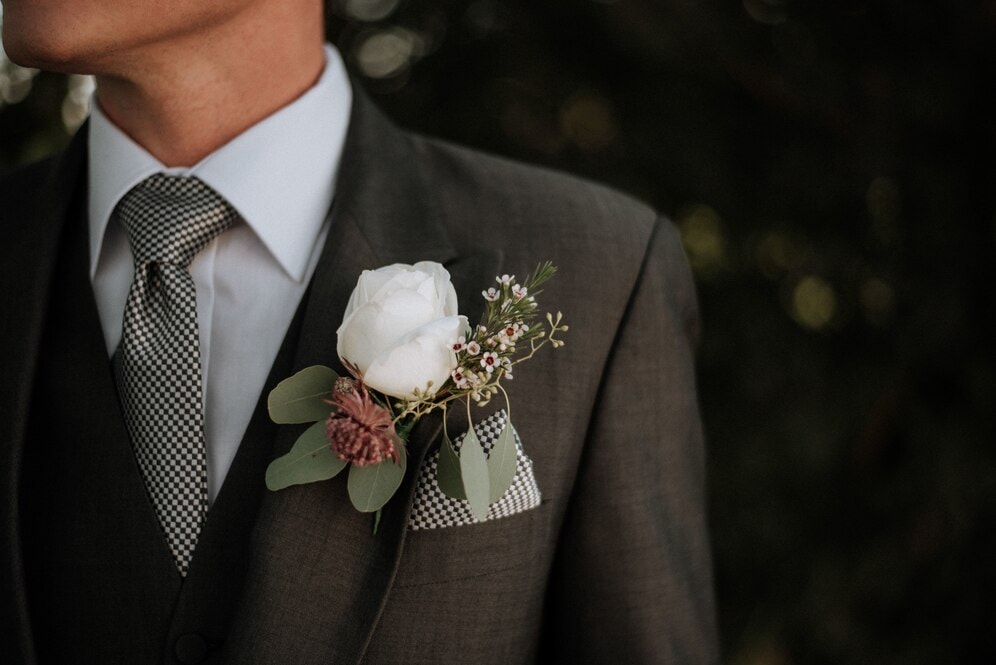
Your wedding attire matters! Set aside funds for your wedding dress, suit, accessories, and any necessary alterations. After all, you want to look your best when you say “I do.” The attire budget should also account for bridal party outfits if you plan to cover those expenses.
Shopping for wedding attire can be one of the most exciting parts of wedding planning. Start early to allow ample time for fittings and alterations. Consider the overall theme and formality of your wedding when selecting your dress or suit, ensuring it complements the event’s style and setting.
Music and Entertainment (10%)
Keep the dance floor buzzing with music and entertainment. Whether you opt for a DJ, live band, or other services, allocate a portion of your budget to keep the party going. The right music and entertainment can elevate the mood of your celebration and ensure that your guests have a memorable time.
When choosing entertainment, think about your personal preferences and the atmosphere of the reception venue you want to create. Discuss playlists, special requests, and any specific moments you want to highlight with your chosen DJ or band. Booking early can also help secure your top choice and potentially save money.
Flowers and Decorations (10%)
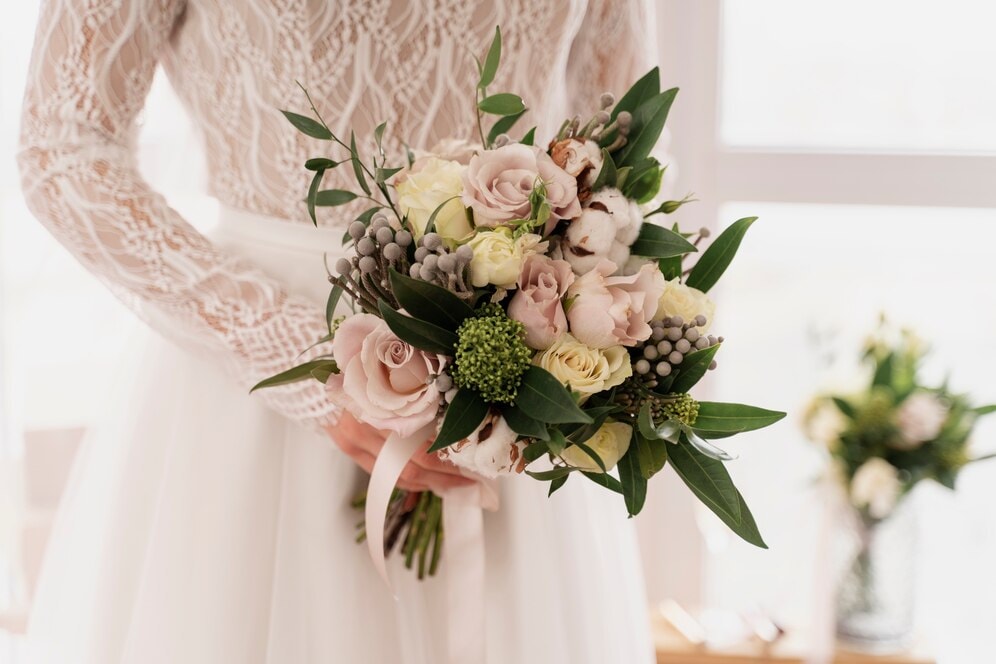
Flowers, centerpieces, and other decor items fall under this category. From bouquets to table arrangements, these details add charm and elegance to your celebration. Investing in beautiful floral designs and decorations can transform your venue and create a visually stunning environment.
Work closely with your florist and decorator to select flowers and decor that match your wedding theme and color scheme. Be mindful of seasonal blooms, which can be more cost-effective. Additionally, consider reusing ceremony flowers for the reception can cut costs to maximize your budget.
Stationery (5%)
Invitations, save-the-dates, and thank-you cards are essential for communicating with your guests. Allocate a small percentage of your budget to wedding stationery. High-quality stationery sets the tone for your wedding and provides guests with important details about the event.
When selecting your stationery, consider design elements that reflect your wedding’s theme and style. Ordering all your stationery items from the same vendor can ensure consistency and potentially offer cost savings. Don’t forget to budget for postage and any additional costs for custom designs or calligraphy in your guest list.
Miscellaneous (10%)
Sometimes, unexpected expenses arise. Set aside a portion for miscellaneous costs, such as transportation, gifts, and parting favors. Being prepared ensures a smoother planning process and helps cover any last-minute needs or surprises that may come up.
Miscellaneous items can also include tips for vendors, beauty treatments, marriage license fees, and any other expenses that don’t fit neatly into the main categories. Having a buffer in your budget provides peace of mind and financial flexibility as your big day approaches.
Remember, every couple’s priorities are unique. Discuss your budget openly with your soon-to-be spouse to ensure you’re unanimous. Whether you’re working with a tight budget or have more flexibility, planning ahead will make the journey enjoyable and stress-free.
Common Wedding Planning Pitfalls to Avoid

Planning a wedding is an exciting journey, but it can also be overwhelming. To ensure a smooth process, and to avoid overspending on your wedding budget breakdown steer clear of these common pitfalls:
Not Setting a Realistic Overall Budget
Be honest about what you can afford. Overestimating your average wedding costs can lead to financial strain later on, affecting not only your wedding day but also your future finances.
Consider all factors, including catering costs, guest entertainment, transportation expenses, and even small items like wedding favors. Setting a realistic budget from the start will help you make informed decisions and prioritize your spending effectively.
It’s important to involve your partner in these discussions to ensure both of you agreed. Take the time to research average costs for the type of wedding you envision and be prepared to make adjustments based on your financial reality.
Remember, a beautiful wedding doesn’t have to be extravagant; it’s about creating a memorable day within your means.
Forgetting to Track Expenses

Keeping detailed records of every expense is crucial. Whether it’s the venue, student photographers, or makeup artists, knowing where your money is going helps you stay within your budget.
Create a spreadsheet for your wedding budget breakdown or use wedding planning apps to log each cost as it arises, ensuring nothing slips through the cracks.
Regularly reviewing your expenses will help you identify areas where you might be overspending and allow you to adjust your budget accordingly. This proactive approach can prevent financial surprises and give you greater control over your wedding finances.
Underestimating Costs
Small expenses add up quickly. Many couples overlook minor costs like postage for invitations, gratuities for vendors, wedding cake, or attire alterations, which can accumulate and strain your budget. Allocate a buffer for hidden costs—those unexpected fees that can catch you off guard—and ensure you have a contingency fund to cover these extras.
Discussing your budget with your vendors can also help you understand potential additional costs. This way, you can prepare for any surprises and ensure you have enough funds set aside to cover all aspects of your wedding.
Ignoring Hidden Fees
Vendors may have additional charges beyond their initial quotes. It’s essential to ask about overtime fees, setup costs, and any other surprises that might impact your total accounts.
These hidden fees can quickly inflate your expenses if you’re not careful, so always read contracts thoroughly and ask for detailed estimates before committing.
Being upfront about your budget with vendors can also lead to more transparent pricing and potentially avoid unexpected costs. This practice ensures that both parties are on the agreed and can help prevent last-minute financial stress.
Last-Minute Changes

Rush decisions can be costly. Whether it’s adjusting the dance floor layout or choosing a ring pillow, plan ahead to stay on track and avoid unnecessary expenses. Last-minute changes often incur extra charges, as vendors may need to expedite services or accommodate new requests at a premium.
Finalizing details early allows you to stick to your budget and timeline, reducing the risk of incurring additional fees. By planning ahead and making decisions well in advance, you can enjoy a smoother and more cost-effective wedding planning experience.
Effective communication with your partner is essential for successful wedding planning.. Make sure you’re both on the same page regarding priorities, whether you’re working with a tight budget or have more flexibility. And don’t worry—hair tutorials and welcome bags are important, but staying within your total accounts is even more crucial. You’ve got this!
Steps to Creating Your Wedding Budget

Planning a wedding involves careful financial management to turn your dream day into reality. Here’s a step-by-step guide to help you create a wedding budget that suits both you and your future spouse:
Determine Your Total Budget: Begin by having an open conversation with your partner about your ideal budget. Consider both your willingness and ability to spend. Remember, this initial decision sets the tone for the entire planning process.
List Priorities: What matters most to both of you? Whether it’s the venue, guest entertainment, your wedding cake or that unforgettable parting gift, identifying priorities will guide your budget decisions. These priorities can make all the difference in creating a memorable wedding experience.
Research Costs: Don’t rely on guesswork. Research average costs for each category in your area. Transportation costs, student photographers, and makeup artists—know what to expect. Realistic expectations prevent surprises down the road.
Create a Spreadsheet: Spreadsheets aren’t just for accountants! Use one to track your budget. Record allocated amounts, actual spending, and the remaining balance. It’s your financial compass throughout the planning journey.
Allocate Funds: Based on your priorities, allocate a percentage of your total budget to each category. Whether it’s the cocktail hour or the ring pillow, intentional distribution ensures you’re investing where it matters most.
Track Spending: Regularly update your spreadsheet with actual costs. Staying informed helps you stay on track. Remember, these are just estimates until you see the final numbers.
Adjust as Needed: Flexibility is key. Unexpected expenses may arise, but that’s totally fine. Be willing to adjust your budget allocations as planning progresses. Your wedding should reflect both of you, so adapt as necessary.
Remember, your wedding budget is more than just a collection of numbers—it’s about crafting a day that overflows with love, joy, and treasured memories. It’s about thoughtfully allocating your resources to create a celebration that reflects your unique love story and the commitment you share.
By managing your personal finance wisely, you’re not just planning an event; you’re setting the stage for a day that you and your loved ones will cherish for years to come.
Saving up for a Home with Camella

While planning your wedding, it’s also important to think about your future together. Many couples aspire to buy a home, and saving for a wedding and a house at the same time can be challenging. Here are some tips to help you manage both goals:
Set Clear Savings Goals
Start by determining how much you need to save for both your wedding and your future home. Break down the total amount into smaller, achievable milestones. Knowing your target will keep you motivated and focused.
Open a Dedicated Savings Account
Consider opening separate savings accounts—one for your wedding fund and another specifically for your house savings. Keeping them separate will help you avoid confusion and ensure that you allocate funds appropriately.
Automate Your Savings
Pay yourself first! Set up automatic transfers from your checking account to your dedicated savings accounts. If you get paid on a specific schedule (e.g., every Friday), automate the transfer on that day. This way, you won’t be tempted to spend the money before saving it.
Reduce Monthly Expenses
Take a close look at your everyday spending. Identify areas where you can cut back. Cancel unused subscriptions, opt for generic products instead of name brands, and consider packing lunches instead of eating out. Also, review essential expenses (like insurance and bills) to find ways to lower costs.
Seek Professional Advice
Consult with a financial advisor. They can help you create a customized plan that balances wedding expenses and long-term savings for your dream home. Their expertise will guide you toward making informed decisions.
Consistency and discipline are essential qualities to maintain throughout your wedding planning and financial journey. By adhering to the steps outlined, you’ll be well-equipped to manage both your wedding budget and future homeownership aspirations.
Staying committed to your financial plans and making thoughtful, informed decisions will pave the way for a successful and enjoyable wedding day. Moreover, these habits will also support your long-term goal of purchasing a home.
Remember, with steady effort and careful planning, you can achieve both your ideal wedding and the dream of homeownership. Keep focused, stay dedicated, and watch your plans come to fruition!
Making your money works for your Big Day

To plan a wedding on a budget requires careful consideration and prioritization, but it’s entirely possible to have a beautiful and memorable day without overspending. By understanding average costs, setting a realistic budget, avoiding common mistakes, and strategically allocating your funds, you can create the wedding of your dreams while also preparing for a future together.
Couples opt to focus on what’s truly important to them and make choices that reflect their values and preferences. Additionally, thoughtful financial planning can help ensure you’re not just creating a great wedding day, but also laying a strong foundation for your future, including saving for a home with Camella Homes.
Remember, the most important part of your wedding is the celebration of your love and commitment to each other, and that doesn’t have to come with a hefty price tag. Embrace the process of planning, enjoy each step, and don’t lose sight of the joyous occasion you’re preparing for.
A well-planned budget allows you to savor every moment without the stress of financial worry. Happy planning, and may your wedding day be everything you’ve envisioned and more!

Celebrate Life’s Milestones in Camella!
Make unforgettable memories in a Camella home.
Our communities are designed to elevate your living experience.


